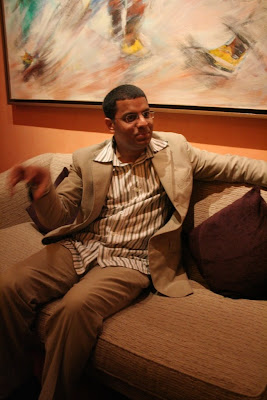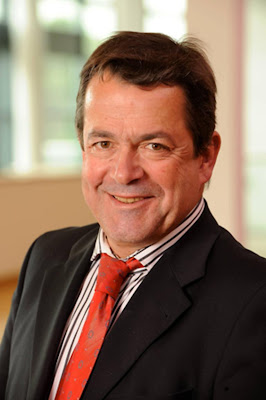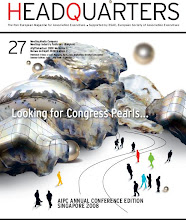 If possible, each year I go to Marrakesh for a couple of days. This year I got the opportunity to see the Festival National des Arts Populaires, a very musical and particularly colourful festival that’s held in the historic Badii Palace. And before I left I was racking my brains over a DMC I know in Marrakesh. “How on earth could I have forgotten that name,” I thought. “Oh well, I’ll suddenly remember it,” I kept on pondering. Right before I entered the Atlas Blue airplane, I made a final attempt to reproduce his name. Unfortunately, I couldn’t. Nothing left then but walk directly to seat 12A and hope that the airplane oxygen would tickle my brain during the flight. The good thing about a flight to Morocco is that you nearly always have the opportunity to sit in the business class of economy class: the emergency exit class! I was in luck, two seats next to each other - 12A and B - with a lot of leg room and no one to bother me. That’s wonderful, flying cheap and chic! And who’s sitting there next to me, yes, who...? Essaid Faiq of Exclusively Morocco, a name that sounds like poetry to many Belgian incentive organisers. Essaid is an extraordinary DMC. A large part of the three-hour flight to Casablanca was spent exchanging thoughts about the relationship Incentive Organiser - DMC, a theme that doesn’t occur enough in conversations, in my opinion.
If possible, each year I go to Marrakesh for a couple of days. This year I got the opportunity to see the Festival National des Arts Populaires, a very musical and particularly colourful festival that’s held in the historic Badii Palace. And before I left I was racking my brains over a DMC I know in Marrakesh. “How on earth could I have forgotten that name,” I thought. “Oh well, I’ll suddenly remember it,” I kept on pondering. Right before I entered the Atlas Blue airplane, I made a final attempt to reproduce his name. Unfortunately, I couldn’t. Nothing left then but walk directly to seat 12A and hope that the airplane oxygen would tickle my brain during the flight. The good thing about a flight to Morocco is that you nearly always have the opportunity to sit in the business class of economy class: the emergency exit class! I was in luck, two seats next to each other - 12A and B - with a lot of leg room and no one to bother me. That’s wonderful, flying cheap and chic! And who’s sitting there next to me, yes, who...? Essaid Faiq of Exclusively Morocco, a name that sounds like poetry to many Belgian incentive organisers. Essaid is an extraordinary DMC. A large part of the three-hour flight to Casablanca was spent exchanging thoughts about the relationship Incentive Organiser - DMC, a theme that doesn’t occur enough in conversations, in my opinion. Wednesday, July 30, 2008
So coincidence does exist
 If possible, each year I go to Marrakesh for a couple of days. This year I got the opportunity to see the Festival National des Arts Populaires, a very musical and particularly colourful festival that’s held in the historic Badii Palace. And before I left I was racking my brains over a DMC I know in Marrakesh. “How on earth could I have forgotten that name,” I thought. “Oh well, I’ll suddenly remember it,” I kept on pondering. Right before I entered the Atlas Blue airplane, I made a final attempt to reproduce his name. Unfortunately, I couldn’t. Nothing left then but walk directly to seat 12A and hope that the airplane oxygen would tickle my brain during the flight. The good thing about a flight to Morocco is that you nearly always have the opportunity to sit in the business class of economy class: the emergency exit class! I was in luck, two seats next to each other - 12A and B - with a lot of leg room and no one to bother me. That’s wonderful, flying cheap and chic! And who’s sitting there next to me, yes, who...? Essaid Faiq of Exclusively Morocco, a name that sounds like poetry to many Belgian incentive organisers. Essaid is an extraordinary DMC. A large part of the three-hour flight to Casablanca was spent exchanging thoughts about the relationship Incentive Organiser - DMC, a theme that doesn’t occur enough in conversations, in my opinion.
If possible, each year I go to Marrakesh for a couple of days. This year I got the opportunity to see the Festival National des Arts Populaires, a very musical and particularly colourful festival that’s held in the historic Badii Palace. And before I left I was racking my brains over a DMC I know in Marrakesh. “How on earth could I have forgotten that name,” I thought. “Oh well, I’ll suddenly remember it,” I kept on pondering. Right before I entered the Atlas Blue airplane, I made a final attempt to reproduce his name. Unfortunately, I couldn’t. Nothing left then but walk directly to seat 12A and hope that the airplane oxygen would tickle my brain during the flight. The good thing about a flight to Morocco is that you nearly always have the opportunity to sit in the business class of economy class: the emergency exit class! I was in luck, two seats next to each other - 12A and B - with a lot of leg room and no one to bother me. That’s wonderful, flying cheap and chic! And who’s sitting there next to me, yes, who...? Essaid Faiq of Exclusively Morocco, a name that sounds like poetry to many Belgian incentive organisers. Essaid is an extraordinary DMC. A large part of the three-hour flight to Casablanca was spent exchanging thoughts about the relationship Incentive Organiser - DMC, a theme that doesn’t occur enough in conversations, in my opinion.
Labels:
atlas blue,
essaid faiq,
marrakesh,
morocco
Wednesday, July 23, 2008
Do you speak hot potato English?
 Of course Thomas Rupperti from Austria Center Vienna was right when he suddenly started talking hot potato English in front of an astonished room during AIPC’s 50th General Assembly in Singapore. If only he had brought the message with a bit more tact. Hot Potato English really exists, as does French Fries English, Patatas Bravas English and Kartoffel English, and so on… It’s a popular phenomenon during international conventions that there are two kinds of participants: English speakers and foreign speakers. The first speak their language without qualms during public sessions, often without taking into consideration the people for whom English is their second or third language. Americans and Australians sometimes talk gibberish and swallow their words.
Of course Thomas Rupperti from Austria Center Vienna was right when he suddenly started talking hot potato English in front of an astonished room during AIPC’s 50th General Assembly in Singapore. If only he had brought the message with a bit more tact. Hot Potato English really exists, as does French Fries English, Patatas Bravas English and Kartoffel English, and so on… It’s a popular phenomenon during international conventions that there are two kinds of participants: English speakers and foreign speakers. The first speak their language without qualms during public sessions, often without taking into consideration the people for whom English is their second or third language. Americans and Australians sometimes talk gibberish and swallow their words.In all honesty I dare to say that I only understood half of what Professor James Gilmore (From the Experience Economy to Authenticity) said. That’s a real pity, after all, he was a keynote speaker and had a fascinating story to tell. English speakers should be briefed about talking slow, clear and easy English during congresses. And foreign speakers should get the advice to train their English because the fact is that English is the international way of communicating.
 And who was certainly right during the General Assembly was AIPC President Edgar Hirt. He deserves the credit as a German speaker for setting the best example of how to be a good speaker: in English and understandable up to the final word! Don’t look back, that was his message, but look forward by practicing good English for everyone.
And who was certainly right during the General Assembly was AIPC President Edgar Hirt. He deserves the credit as a German speaker for setting the best example of how to be a good speaker: in English and understandable up to the final word! Don’t look back, that was his message, but look forward by practicing good English for everyone.I prefer Patates Frites (English) with mayonnaise. People used to tell me that you learn English the best if you have a hot potato in your mouth. It makes you pull funny faces and make strange sounds. In one word, unintelligible! I think some speakers still have a hot potato in their mouth. ‘Leities end Zjieentlemen, leits tak jin Tudou English’. Tudou is Chinese for potato…
Labels:
aipc,
Edgar Hirt,
English,
James Gilmore,
Ralf Kleinhenz
Cats should catch mice!
 Now I definitely know, the best congresses are made by excellent speakers. The better the speaker, the better the congress. The past 4 years I’ve fallen silent 4 times during a congress. The first time was in the year 2004 when The Most Revd. Desmond Mpilo Tutu gave a speech during the opening of the ICCA congress. During those two hours it was as quiet as the night with the moon and her stars. His message was clear: equality brings life. A second time was in November 2007 during the Holland Association Symposium in Amsterdam. Professor van Grieken spoke of the miracle of the first republic in the world: Holland during the regency period. You could hear a mosquito fly in the hall. His message was: democracy creates prosperity. A third time, also in 2007, was during the opening of the IFLA congress in Durban. Justice Albie Sachs, the white attorney who lost his arm during an attack, spoke about his battle against appartheid. It was as calm as the wind inside the hall. His message was: freedom stimulates growth.
Now I definitely know, the best congresses are made by excellent speakers. The better the speaker, the better the congress. The past 4 years I’ve fallen silent 4 times during a congress. The first time was in the year 2004 when The Most Revd. Desmond Mpilo Tutu gave a speech during the opening of the ICCA congress. During those two hours it was as quiet as the night with the moon and her stars. His message was clear: equality brings life. A second time was in November 2007 during the Holland Association Symposium in Amsterdam. Professor van Grieken spoke of the miracle of the first republic in the world: Holland during the regency period. You could hear a mosquito fly in the hall. His message was: democracy creates prosperity. A third time, also in 2007, was during the opening of the IFLA congress in Durban. Justice Albie Sachs, the white attorney who lost his arm during an attack, spoke about his battle against appartheid. It was as calm as the wind inside the hall. His message was: freedom stimulates growth.  And last month in Singapore during AIPC’s 50th General Assembly it was as quiet as a mouse when Professor Kishore Mahbubani entertained the attending crowd for an hour on The
And last month in Singapore during AIPC’s 50th General Assembly it was as quiet as a mouse when Professor Kishore Mahbubani entertained the attending crowd for an hour on The  New Asian Hemisphere. And do you know what stuck during his keynote speech? The story of the black and white cat. Whether a cat is white or black, grey or brown, it doesn’t matter, as long as it catches mice. This also appeals to humans. Create a world where everyone can use their brain capacity. That would be a rich country! Even an Untouchable in the Indian caste system could grow to become a director of the National Bank. I know places where minds are locked away. The people in these places know lots of misery and all this because constraint of freedom leads to poverty.
New Asian Hemisphere. And do you know what stuck during his keynote speech? The story of the black and white cat. Whether a cat is white or black, grey or brown, it doesn’t matter, as long as it catches mice. This also appeals to humans. Create a world where everyone can use their brain capacity. That would be a rich country! Even an Untouchable in the Indian caste system could grow to become a director of the National Bank. I know places where minds are locked away. The people in these places know lots of misery and all this because constraint of freedom leads to poverty.
Labels:
aipc,
Holland,
ICCA,
IFLA,
Kishore Mahbubani,
sachs,
tutu,
van grieken
Subscribe to:
Posts (Atom)





